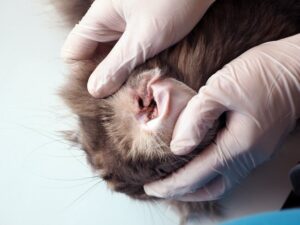Ear Mites in Cats
You may have noticed something different about your cat. You may have seen your cat scratching their ears and continuing to scratch. What could this mean? Unfortunately, this could mean that your cat has ear mites. Ear mites are more than just an itchy bother. They actually cause a great deal of discomfort for your cat and can progress into much worse problems. Let’s investigate what ear mites could mean for your cat.
What are Ear Mites in Cats?
Ear mites are also called otodectes cynotis mites. They are parasites that infest a cat’s ears and feed on wax and dirt in the cat’s ear. They are a nuisance to the cat and can quickly multiply. In fact, they hatch in only 4 days and develop to adulthood in just 3 weeks after that. Ear mites can be a real irritation to your cat. They can even cause a condition called otodectic mange. But they can also be easily treated. 
What Causes Ear Mites in Cats?
Ear mites are typically spread from cat to cat by direct contact with each other. The cats serve as hosts for this parasitic nuisance and when cats have close contact, the ear mites will travel from host to host.
What are some Signs and Symptoms of Ear Mites in Cats?
Ear mites are very annoying to cats. You will be able to tell that they have mites if you notice
- Your cat is shaking their head
- Your cat is scratching their ears
- A noticeable black, sticky discharge
- An odor that is unusual and worse than usual
Keep in mind, sometimes cats scratch their ears and/or shake their heads due to allergies or other reasons. If you suspect mites, take your cat to your veterinarian to get an official diagnosis.
Diagnosing Ear Mites in Cats
When you take your cat to the vet, they will look for clinical signs of ear mites. Next, if it appears that your cat does have ear mites, the vet may take a sample of the contents of the cat’s ear with a large swab. The swab will be used to look under the microscope to find the signs of mites which include ear mite eggs and/or the mites themselves. Even if mites are not found, your veterinarian may decide to treat for ear mites anyway. Depending on the condition of your cat’s ears, your veterinarian may ask to perform additional diagnostic tests to make sure there are no other issues.
Is there a Cure for Ear Mites?
Yes. Thankfully, ear mites are 100% treatable. They can be cured completely. However, if your cat’s ear mites have caused secondary issues such as rash, yeast, or scaly ears, further treatment may be required.
How to Treat Ear Mites in Cats
Once your cat has been diagnosed with ear mites, the treatment process is simple. Your vet will prescribe a medication or do a single in house treatment. As long as you apply the prescribed medication properly, the ear mites should resolve shortly. Medications are typically topical but there have been some developments of medications that are oral antiparasitic medications that treat most common feline parasites.
What is the Cost of Treating Ear Mites in Cats?
Treatment of ear mites is a relatively affordable process. Although each veterinary clinic is different, most treatment plans are inexpensive. Depending on the severity of the infection and any other secondary conditions the ear mites may have caused, it is likely that you will just pay for the initial office visit, the diagnostic microscope test, the ear cleaning, the cost of the medication, and any follow-up visits or treatment.
So, are Ear Mites in Cats Contagious?
Yes, they absolutely are contagious to other cats. If you have multiple cats and one of them has ear mites, it is likely that all of them have ear mites. Ear mites are also contagious to dogs, but cats are most likely to contract them, due to their lifestyle.
Are ear mites contagious to humans? No, they are not.
Recovery from and Management of Ear Mites
Once treated with medication, your cat should recover in about 3 weeks. However, some symptoms like itching and irritation will usually subside in the first week or so.
Prevention
There are several topical medications on the market today that can be used to prevent ear mites. Talk to your veterinarian to learn more. It’s also important to make sure you thoroughly clean and wash all bedding or furniture the cat was on. The eggs can hatch and reinfect if the cat is not on a proper preventative.
Reed Animal Hospital
If you’re in the San Jose area and seeking veterinary care, you can turn to Reed Animal Hospital. From ear mites to flea and tick prevention to routine vaccinations, we want to help you care for your pet. We offer a comprehensive list of services, including referrals to specialty surgeons for more complex issues. For more information, visit our website or reach us by phone at (408) 369-1788 in the Campbell area or (408) 647-2906 in the Saratoga area. We know you love your pet and we want to help you and your pet enjoy a happy and healthy life together. At Reed Animal Hospital, “we treat your pet as if they were our own.”


